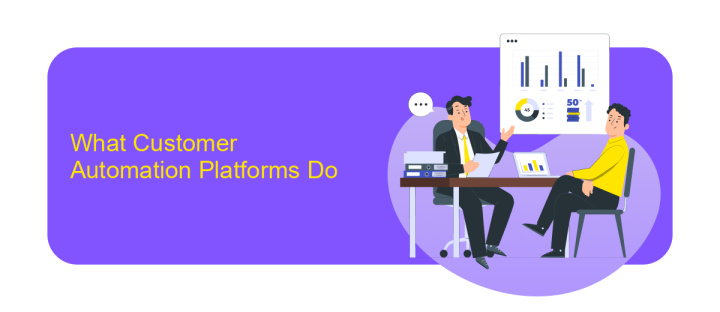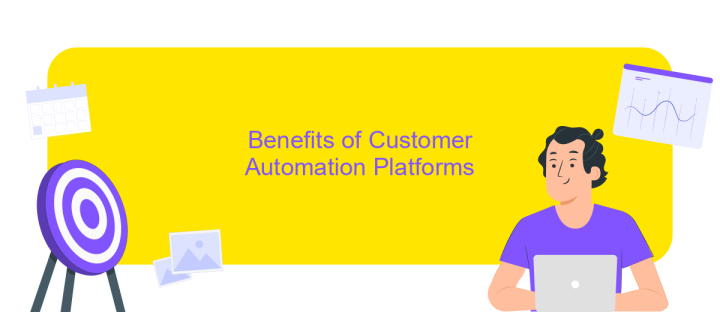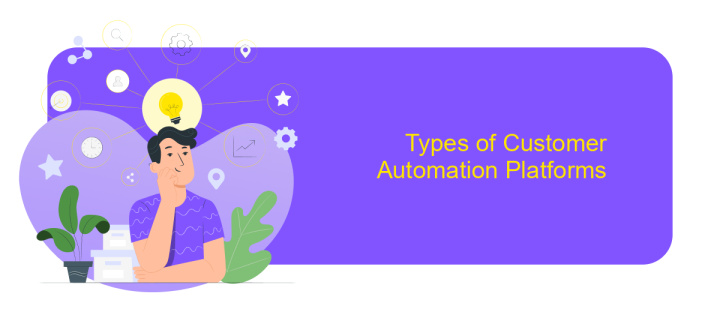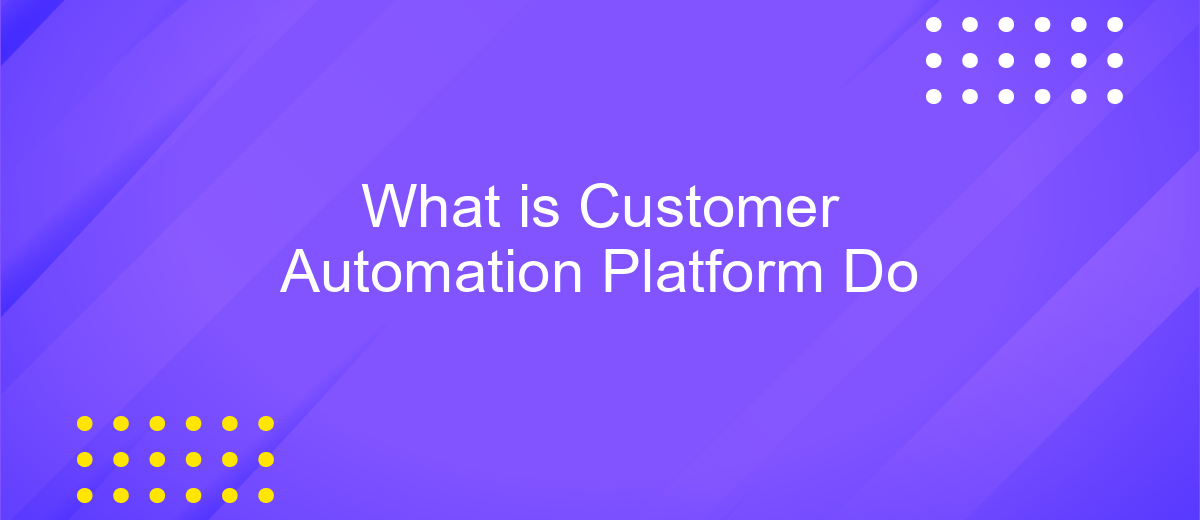What is Customer Automation Platform Do
In today's fast-paced business environment, efficiency and personalization are key to maintaining a competitive edge. A Customer Automation Platform (CAP) serves as a crucial tool for businesses aiming to streamline their customer interactions while enhancing user experience. By automating repetitive tasks and integrating data across various channels, CAPs enable companies to focus on building stronger relationships with their customers, ultimately driving growth and satisfaction.
Introduction
In today's fast-paced digital landscape, businesses are increasingly turning to technology to streamline their operations and enhance customer experiences. One such innovation is the Customer Automation Platform (CAP), which is transforming the way companies interact with their clients. CAPs are designed to automate various customer-related processes, enabling businesses to improve efficiency, reduce costs, and deliver personalized services at scale.
- Automates repetitive tasks such as email marketing and customer support inquiries.
- Integrates with existing CRM systems to provide a unified view of customer data.
- Enhances customer engagement through personalized communication and targeted campaigns.
- Provides analytics and insights to improve decision-making and strategy development.
As businesses strive to meet the growing demands of tech-savvy consumers, Customer Automation Platforms offer a competitive edge by optimizing customer interactions and fostering long-term relationships. By leveraging these platforms, companies can not only enhance customer satisfaction but also drive growth and innovation in an increasingly competitive marketplace. Understanding the capabilities and benefits of CAPs is essential for any organization looking to thrive in the digital age.
What Customer Automation Platforms Do

Customer automation platforms are designed to streamline and enhance the way businesses interact with their clients. These platforms automate repetitive tasks, such as sending emails, managing customer data, and tracking interactions, allowing businesses to focus on building stronger relationships with their customers. By leveraging advanced algorithms and machine learning, these platforms can provide personalized experiences, predict customer needs, and optimize marketing strategies. This not only improves customer satisfaction but also increases operational efficiency and drives growth.
In addition to automation, customer automation platforms often integrate with a variety of other services to create a seamless workflow. For instance, platforms like ApiX-Drive enable businesses to effortlessly connect different applications, allowing data to flow smoothly between them. This integration capability ensures that all customer interactions are consistent and up-to-date, providing a comprehensive view of each customer. By utilizing such platforms, companies can enhance their decision-making processes and deliver a more cohesive customer experience, ultimately leading to increased loyalty and retention.
Benefits of Customer Automation Platforms

Customer automation platforms have become essential tools for businesses seeking to enhance efficiency and customer satisfaction. These platforms streamline processes by automating repetitive tasks, allowing employees to focus on more strategic activities. By integrating various customer touchpoints, they provide a unified view of customer interactions, enabling personalized communication and improved service delivery.
1. Increased efficiency: Automating routine tasks reduces manual effort, leading to faster response times and minimized errors.
2. Enhanced customer experience: Personalized interactions based on comprehensive customer data foster stronger relationships and loyalty.
3. Cost savings: Automation lowers operational costs by reducing the need for extensive manpower and resources.
4. Data-driven insights: Real-time analytics and reporting help businesses make informed decisions and identify growth opportunities.
5. Scalability: As businesses grow, automation platforms can easily adapt to increased workloads without compromising performance.
Ultimately, customer automation platforms empower businesses to deliver exceptional service while optimizing resources. By leveraging these tools, companies can stay competitive in a rapidly evolving market, ensuring they meet the ever-changing needs of their customers. The benefits extend beyond operational improvements, contributing to long-term success and customer satisfaction.
Types of Customer Automation Platforms

Customer automation platforms are essential tools that help businesses streamline their operations by automating various customer-related processes. These platforms can significantly enhance customer engagement, improve efficiency, and boost overall productivity. By leveraging these tools, companies can provide personalized experiences and maintain consistent communication with their customers.
There are several types of customer automation platforms, each designed to address specific business needs and customer interactions. Choosing the right platform depends on the particular requirements and goals of an organization. Understanding the different types can help businesses make informed decisions and maximize their investment in automation technology.
- Marketing Automation Platforms: Automate marketing tasks such as email campaigns, social media posting, and lead generation.
- Sales Automation Platforms: Streamline sales processes, including lead management, customer relationship management (CRM), and sales forecasting.
- Customer Service Automation Platforms: Enhance customer support through chatbots, automated responses, and ticketing systems.
- Workflow Automation Platforms: Optimize internal processes by automating routine tasks and facilitating collaboration across departments.
Each type of platform offers unique features and benefits, catering to different aspects of customer interaction and business operations. By selecting the appropriate customer automation platform, businesses can improve their efficiency, reduce manual workload, and ultimately enhance customer satisfaction.


Conclusion
In conclusion, a Customer Automation Platform is an essential tool for modern businesses striving to enhance customer engagement and streamline operations. By automating repetitive tasks, businesses can focus on delivering personalized experiences, improving customer satisfaction, and driving growth. The integration of various customer touchpoints into a single platform allows for seamless communication and data analysis, enabling businesses to make informed decisions and adapt to changing market dynamics.
Moreover, with the help of integration services like ApiX-Drive, businesses can effortlessly connect their existing systems and applications, ensuring a smooth flow of information across platforms. This not only reduces the complexity of managing multiple systems but also enhances the overall efficiency of business processes. As businesses continue to evolve, embracing customer automation platforms will be pivotal in maintaining a competitive edge and fostering long-term customer relationships.
FAQ
What is a Customer Automation Platform?
How does a Customer Automation Platform benefit businesses?
What types of tasks can be automated with a Customer Automation Platform?
How does integration work in a Customer Automation Platform?
Is it difficult to set up a Customer Automation Platform?
Apix-Drive is a simple and efficient system connector that will help you automate routine tasks and optimize business processes. You can save time and money, direct these resources to more important purposes. Test ApiX-Drive and make sure that this tool will relieve your employees and after 5 minutes of settings your business will start working faster.

